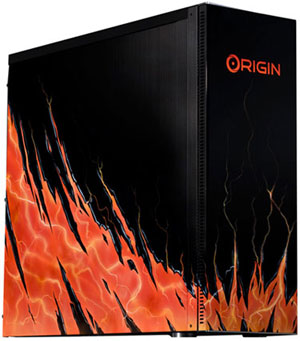The Origin of Speed: Origin's Genesis Gaming System
Performance Summary: All the system configurations we tested qualify as fast, but Origin's Genesis waves at fast while rocketing past it in the left-hand lane. Best of all, Origin doesn't compromise build quality or component stability in an attempt to juice their system farther. This is a rig that's absolute top of the line now, and will carry any buyer for years to come—DX11 games, even when plentiful, won't be an issue. Short of opting for an Intel SSD RAID 0 or an even more esoteric storage solution, there's not much an end user could do to improve system performance at the moment.
![]()
The big question, of course, is whether or not it ever makes sense to buy a $5,000 computer, period, even if you can afford one. To that end, we'd like to share a few observations. First, it's important to remember that a Genesis rig doesn't have to cost $5,000—opting for a stock Core i7 2.67GHz processor, a 750W Corsair PSU, and a single Radeon 5870 knocks 50 percent off the price tag.
Price is not the only factor in the equation. The reason enthusiasts typically buy from a boutique builder in the first place is because they want the advantages that come with having someone else do the work without having to spend several hours digging bloatware off the system or calling some foreign country for tech support, in the event that a component fails. The question of which boutique builder builds the best system is only partially related to price—the scope and depth of a company's customer service is a huge factor.

In this area, Origin delivers in spades. In our discussions with the company, we repeatedly proposed hypothetical scenarios that gave the manufacturer plausible ground on which it could deny warranty coverage or claim that its "lifetime" labor guarantee had been voided because of specific actions by the customer. No matter what scenario we came up with (and we got creative), Origin's responses always honored the spirit of their warranty as well as the literal agreement.
Here's one example, with our question in italics:
Generally speaking, most OEMs stop considering a computer to be "theirs" if / when the customer replaces the motherboard and / or the processor. Do you have any sort of predefined point at which a system stops being an Origin PC and no longer qualifies for lifetime labor / phone support? To what degree does Origin need to be involved in the part upgrade / replacement process in order for a system to continue to qualify as an Origin desktop?
We do not have any predefined point where the labor / phone gets cut off. The life time Phone/E-support and labor is truly for life. We will always try to help answer a customer's question or problem. The only thing we require is to be notified of any hardware changes so that we can update the customer's records and provide accurate support and advice going forward. Think of it as what you probably go through all the time. Friends and family probably come to you for advice and help. Once you become part of the ORIGIN family you can always come to us for help and advice. Buy an Origin system, and you buy access to a service agreement that's treated with respect, good faith, and value. That's what the company essentially guarantees, and it's consistent with the tone of our conversations. The company is new, but as far as we can tell, it's nailed its priorities right out of the gate.
And the response, from company CEO Kevin Wasielewski:

| | |
|
|






